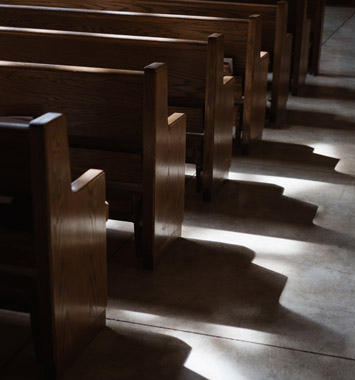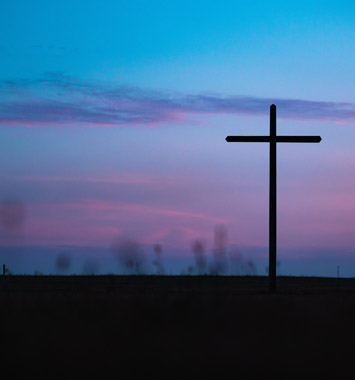Answers Series
Is there Hope beyond the Grave?
Is there Hope beyond the Grave with Nick Park
One of the big questions that people have always struggled with, perhaps since human history began, concerns what happens after death. Is there a hope beyond the grave? Is there hope in the face of death? The Christian position is that there is not just hope but a wonderful destiny.
Of course, not everyone believes in life after death. There are those who believe that all our lifelong learning, relationships and experiences will be snuffed out in an instant. In such a worldview it is difficult to see how anything has any real meaning or value. Life becomes nothing more than a nice dream. No reality or substance, and not even the experience of remembering it when you wake.
If that were true, there would be little reason for hope, either in this life or the next. I think of the things that are the most meaningful in life, such as holding my wife in my arms on our wedding day, holding my daughter in my arms on the day she was born, or holding my granddaughter in my arms as I sing her to sleep. These would have no meaning whatsoever if they were simply fleeting experiences with no lasting significance.
In many forms of Buddhism, the outlook is no more hopeful. According to this philosophy, our individual identities are lost as we are absorbed into the whole. A long cycle of reincarnations leads to Nirvana, which turns out to be a moment of enlightenment in which you cease to have individual existence. At that point, we are told, we will become anatta (non-self) and sunyata (emptiness).
Other ancient peoples had primitive concepts of an afterlife that were essentially the same as this life, but somehow less real. Excavations reveal that even Neanderthals had funeral rites, burying one another with caches of food and weapons to stave off hunger, and to kill enemies, in some shadowy existence beyond the grave. Ancient Egyptians had complex mummification techniques, wrapped up in mythologies connected with the sun rising, the Nile River flooding, and gods that looked like cats or crocodiles.
The Ancient Greeks believed that a ferryman, Charon, rowed dead souls across the River Styx to dwell in the underworld but there, the dead were believed to participate in the same petty jealousies and intrigues that had characterised their lives on earth.
Among the Jews, there was talk of a place called “Sheol” where the dead gathered. In later Judaism, Sheol was viewed as having separate compartments for the good and the wicked. The righteous dwelled in Abraham’s bosom, whereas the wicked suffered in burning fire.
Even within Christianity, we find nominal Christians with all kinds of pagan and unbiblical concepts. I remember when my youngest daughter died, people offered well-intentioned but nonsensical platitudes about our child having become an angel – a pagan notion with no basis in the Bible or in historical Christian teaching. Many other cultural Christians imagine an afterlife in which they float on clouds playing harps much like the disembodied spirits in the movie Casper the Friendly Ghost.
Even in Evangelical circles, we can hear the body being disparagingly described as simply an ‘earth suit,’ or the oft-repeated mantra that ‘we are a spirit, have a soul, and live in a body’.
According to this way of thinking, earthly deeds don’t matter and the good universe that God created has no value or significance.
But the New Testament speaks of a very different future. The great hope of the Christian Church is looking forward to a future resurrection, when our eternal soul and spirit will be reunited with a glorious, resurrected body. This biblical vision of life after death, in the words of NT Wright, is not less real than this life. It is more real. There will be a new heaven and a new earth.
This hope is no mere Nirvana where we cease to have individual identity or value. Nor is it a lazy Paradise where we lounge around in a garden. Our individual destiny is uniquely ours, but it is also intrinsically bound up with the destiny of God’s Church.
The Old Testament did contain some foundational truths of an afterlife that went way beyond simple pleasures or pain. The prophet Daniel spoke of a resurrection to either shame or contempt (Daniel 12:2-3). This reflects a deep-seated human need. In many ways, shame is something that we fear more than pain. People sometimes take their own lives rather than face the exposure and shame that might come from their wrong choices.
In contrast to everlasting shame, Daniel also referred to those who would shine like the stars for ever and ever. The New Testament speaks of heavenly crowns that add glory to the future state of believers. This is not to imply that we somehow earn our salvation. Quite the opposite, in fact. The same verses that speak of salvation as being a gift that is received by faith (Ephesians 2:8-10) then go on to describe our good works as being part of our role as the embodiment of God’s handiwork – or ‘masterpiece.’ The Greek word here, poiema, was used of a craftsman who would place the very best example of his workmanship in his shop window, declaring his skills and expertise to everyone who might pass by.
The idea is that the Church of Jesus Christ, the company of all those who have been redeemed and transformed through God’s grace, will shine forth for all eternity as the ultimate display of God’s love, power and wisdom. It is a wonderful destiny where our part in building God’s Church reflects even greater glory to God.
In this role of eternal glory, there will be no selfish ambition or competition. We will not be disappointed because someone else received a greater prominence than ourselves, for such jealousy is simply a manifestation of a lack of love. When we truly love someone, we rejoice in their achievements even more than in our own.
For example, I still remember my own university graduations and conferring ceremonies. Yet I derived a much greater pleasure at witnessing my daughter receive her PhD. I wasn’t whispering, “I wish it was me being honoured!” No, my love for her enabled me to rejoice more at her honour than at any honour I might have ever received myself. That is how genuine love is; it leaves no place for selfishness or resentment.
In our great destiny beyond the grave, when we stand with the Church as part of God’s masterpiece for all eternity, our pure love for each other will enable us to rejoice in one another’s achievements. The things we learned in this life, our relationships and values, will not fade away, but will become more meaningful.
This great hope of the Christian Church, when understood rightly, eclipses every other concept of the afterlife that any religion or philosophy has ever promised.
Explore More
In depth articles from our Answers Series
- Evidence for a Creator
- The Value of Human Life
- What is our Purpose
- Hope beyond the Grave
- Christianity - Problem or Solution?
- Suffering - Does God care about our pain?







